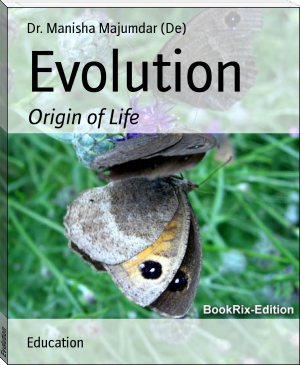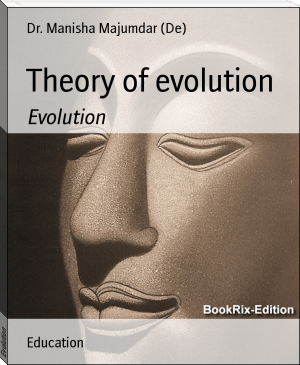Freedom in Science and Teaching - Ernst Haeckel, T. H. Huxley (epub e reader TXT) 📗

- Author: Ernst Haeckel, T. H. Huxley
Book online «Freedom in Science and Teaching - Ernst Haeckel, T. H. Huxley (epub e reader TXT) 📗». Author Ernst Haeckel, T. H. Huxley
When I first read this and other astounding statements in Virchow's paper, I involuntarily asked myself, "Can this be the same Virchow from whom, twenty-five years ago, I learnt in Würzburg that the soul-functions of man and animals depend on mechanical processes in the soul-organs; that these organs are, like all other organs, composed of cells, and that the functional activity of an organ is nothing more than the sum of the activity of all the cells which compose it? Is this the same Virchow whose most vital doctrine it was that all the physical and psychical processes of the human organism were to be referred to the mechanics of cell life; who supported the view of the unity of all the phenomena of life with the same emphasis with which we are now obliged to defend it against his attacks?"
In fact, and beyond a doubt, we have here a new proof of Virchow's complete change in all fundamental scientific principles. For the cellular psychology which I advance is only a necessary consequence of the cellular physiology promulgated by Virchow. His present opposition to the former is either a renunciation of the latter or an untenable and inconsequent position. To explain this astonishing metapsychosis, we shall do well first to glance at the soul in general, and then give particular consideration to the cell-soul.
What is the Soul or Psyche? The innumerable different answers which have been given to this crowning question of psychology, may collectively, when freed from all extraneous matter, be brought under two groups which we may shortly designate as the dualistic and the monistic soul-hypothesis. According to the monistic (or realistic) soul-hypothesis, the "soul" is nothing more than the sum or aggregate of a multitude of special cell-activities, among which sensation and volition--sensual perception and voluntary movement--are the most important, the most common, and the most widely diffused; associated with these in the higher animals and in man, we find the more developed activities of the ganglionic cells which are included under the conceptions of Thought, Consciousness, Intellect, and Reason. Like all the other functional-activities of the organic cells, these soul-functions depend ultimately on material phenomena of motion, and more particularly on the motions of the plasson-molecules or plastidules, the ultimate atoms of the protoplasma, and perhaps of the nucleus also; therefore we should be able actually to grasp and explain them, as well as every other cognisable natural process, if we were in a position to refer them to the mechanics of atoms. This monistic soul-hypothesis, then, is at bottom mechanistic. If psychical mechanics--psychophysics--were not so infinitely complex and involved, if we were in a position to take a complete view of the historical evolution of the psychic functions, we could reduce the whole of them (including consciousness) to a mathematical "soul-formula."
According to the opposite, or dualistic (or spiritualistic) soul-hypothesis, the soul is, on the contrary, a peculiar substance, which most people somewhat grossly conceive of as a gaseous body, while others picture it with more subtlety, as an immaterial essence. This "soul-substance" subsists independently of the animal-body, and stands in only a temporary connection with certain organs of that body--the soul-, or mental-organs. It has been imagined that this soul-matter, which resembles that imponderable ether which is the medium of light, is diffused between the ponderable molecules of the soul-organs and especially of the nerve-cells, and that this connection of the imponderable "soul" with the ponderable body subsists only so long as the individual life lasts. At the instant of the first beginning of the individual organism, at the moment of generation, this imponderable "soul" passes into the body, and at the instant of death, at the annihilation of the living individual, it again quits the body. This mystical or dualistic soul-hypothesis, which, as is well known, is to this day universally accepted, is fundamentally vitalistic, inasmuch as it regards the force which is bound up with the soul-substance, like the "vital force" of a past time, as a peculiar force quite independent of mechanical forces. This force does not depend on the material phenomena of motion, and is quite independent of the mechanics of atoms. The highest law of modern natural science, the law of the conservation of force, has, therefore, no application in the region of soul-life, and that mechanical causality which prevails throughout all the processes of nature does not exist for the soul. The Psyche, in a word, is a supernatural phenomenon, and the supernatural department of the spiritual world stands free and independent of the natural department of the material world.
If we now compare the psychological views of the youthful and unprejudiced Virchow of Würzburg with those of the older and mystical Virchow of Berlin, there can be no doubt in the minds of the impartial that the former, a quarter of a century ago, was as decided and logical a monist as the latter is at present a confessed and convicted dualist. The distinguished position which Virchow, twenty-five years since, won by his natural conception of the nature of man, and the great fame which he then earned in the fight for the truth, rest precisely on this, that on every occasion he maintained with his utmost vigour the unity of all vital phenomena, and asserted their mechanical character. All organic life, even the soul-life, rests on mechanical principles, on that causal mechanism of which Kant said that "it alone contained a practical interpretation of nature," and that "without it no natural science can exist." On this point Virchow says well in his discourse on "Efforts at Unity in Scientific Medicine," 1849:--"Life is only a peculiar sort of mechanics, though it is indeed the most complex form of mechanics; that in which the usual mechanical laws fall under the most unusual and manifold conditions. Thus life, compared with the universal processes of motion in nature, is a thing peculiar in itself; but it does not constitute a diametrical, dualistic opposition to those laws; it is only a peculiar species of motion. The motion itself is a mechanical one, for how should we become cognisant of it if it were not based on the sensible properties of bodies? The media of the motion are certain chemical matters, for we recognise none but chemical matter in bodies. The individual acts of motion reduce themselves to mechanical, or physico-chemical, modifications of the constituent elements of the organic unities, the cells and their equivalents." These and many similar utterances in Virchow's earlier writings, and especially in the essay I have mentioned, "On the Mechanical Conception of Life," leave no doubt that he formerly supported, with a clear conscience and his utmost energy, in psychology as in the other collected departments of physiology, that very mechanical standpoint which we to-day accept as the essential basis of our monism, and which stands in irreconcilable antagonism to the dualism of the vitalistic doctrine. To none of my teachers am I so deeply indebted for my emancipation from all the prejudices of the dualistic doctrine, and for my conversion to the monistic, as to Rudolf Virchow; for it was his superior guidance which most firmly convinced me, and many others, of the exclusive importance of the mechanical view of nature. He led me to a clear recognition of the fact that the nature of man, like every other organism, can only be rightly understood as a united whole, that this spiritual and corporeal being are inseparable, and that the phenomena of the soul-life depend, like all other vital phenomena, on material motion only--on mechanical (or physico-chemical) modifications of cells. And it was in perfect agreement with my most honoured master that I subscribed then, and at this day still subscribe, to the proposition with which he, in September 1849, closed the preface to the above-mentioned "Efforts at Unity." "It is possible that I may have erred in details; in the future I shall be ready and willing to acknowledge my mistakes and to rectify them, but I enjoy this conviction, that I shall never find myself in the position of denying the principle of the unity of the human nature with all its consequences!"
To err is human! Who can say to what diametrical contradiction to his firmest convictions man may not in the future be driven by his adaptation to new relations in life? If we compare these stout monistic declarations of 1849 and 1858 with the equally decided dualistic utterances in Virchow's Munich address of 1877, we perceive that he could not give the lie more fiercely to his former fundamental opinions than he has there done. Not quite twenty years have passed by, and yet, in the course of that time, in Virchow's views of the universe, in his conception of human nature, and of the soul-life, a change has been effected than which we can conceive of no greater. We learn to our surprise that psychical and corporeal processes are wholly different phenomena; that no scientific necessity whatever exists for extending the province of psychical processes beyond the circle of those bodies in which, and by which, we see them actually exhibited. "We may ultimately explain the processes of the human mind as chemical, but at any rate, it is not yet our business to amalgamate these two subjects!"
From the whole psychological discussion which is involved in Virchow's Munich address, it is made clear that at the present time he regards the "soul" in a purely dualistic sense as a substance, an immaterial essence which only temporarily takes up its abode in the body. Highly characteristic of this is the remarkable sentence, "If I explain attraction and repulsion as psychical phenomena, I simply throw the psyche out of the window; the psyche ceases to be a psyche." If we substitute for the word "psyche" the word which corresponds to Virchow's earlier mechanistic view--the word "motion" (or peculiar mode of motion)--the sentence runs thus: "If I explain attraction and repulsion as phenomena of motion, I simply throw motion out of the window."
Almost more remarkable is Virchow's assertion that the lowest animals have no psychic properties; that, on the contrary, "these are only to be found in the higher, and, with perfect certainty, only in the highest animals." It is only to be regretted that Virchow has not here stated what he understands by the higher and the highest animals; where that remarkable dividing line is, beyond which the soul suddenly appears in the hitherto soulless body. Every zoologist who is in some degree familiar with the results of comparative morphology and physiology will here clasp his hands in astonishment, for by this proposition Virchow seems to mean that we must ascribe a soul-life only to those animals in which special soul-organs, in the form of a central and peripheral nerve-system, are developed from sense-organs and muscles. But it is admitted that all these different soul-organs with their characteristic properties have originated from single cells through the





Comments (0)